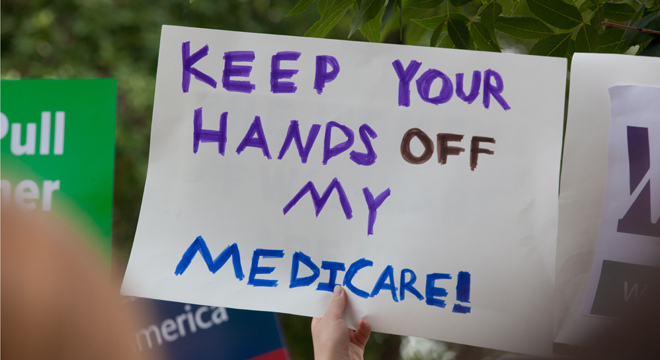The Medicare and Social Security trustees presented mixed news for the country’s two largest and most popular entitlement programs in annual reports released Monday. The analyses suggest that the 2008 economic crisis, and its lingering effects on the economy, have modestly weakened the programs’ finances — but that President Obama’s health care law, if implemented as intended and matched with advancements in health care delivery, will extend the life of Medicare as expected.
The conclusions fuel an ongoing fight between the parties over the propriety of the programs, and the manner in which the federal government should act to provide sustainable retirement security for American workers. In particular, it puts the parties’ vastly different views about Medicare back at the center of the 2012 election — and will force Republicans to continue to defend their far-reaching plan to privatize that program.
Among their many findings, the trustees now project that the Social Security retirement program will exhaust its funds in 2035, three years sooner than projected last year.
“The projections in this year’s report are somewhat more pessimistic than last year’s projections,” Treasury Secretary Tim Geithner admitted in prepared remarks. “For the combined Social Security and Disability Trust Funds, the 75-year actuarial imbalance is up 0.4 of a percentage point. This is in large part due to the Trustees’ assumption of lower real wages over the 75-year projection period.”
The good news is that the trustees believe the Affordable Care Act strengthened Medicare — and project, as they did last year, that the program won’t exhaust its hospital insurance trust fund until 2024. But there’s significant uncertainty surrounding that estimate.
The health care law, the trustees conclude, “is another, and even larger, source of policy-related uncertainty. … The Board assumes that the various cost-reduction measures — the most important of which are the reductions in the payment rate updates for most categories of Medicare providers by the growth in economy- wide multifactor productivity–will occur as the Affordable Care Act requires. The Trustees believe that this outcome, while plausible, will depend on the achievement of unprecedented improvements in health care provider productivity. … Given these uncertainties, future Medicare costs could be substantially larger than shown in the Trustees’ current-law projection.”
The reports illuminate the dramatic differences between the parties over how to change the programs in order to make them more sustainable in the long term. Republicans want to throw the health care law out the window — a step that would dramatically reduce Medicare’s lifetime, and then begin a process of phasing that program out and replacing it with a system in which seniors are provided subsidies to buy private insurance plans. But they recognize their views are politically contentions, and in an official statement reacting to the reports, Romney declined to describe the details of his plan.
“Today’s report reminds us that Medicare must be reformed and strengthened or it will soon collapse,” he said. “President Obama has offered no serious plan of his own, preferring instead to attack and point fingers over problems he refuses to address. Mitt Romney has a comprehensive plan to preserve Medicare for today’s seniors while ensuring that it remains strong for future generations.”
Democrats have a much different view — one that would preserve Medicare’s existing single-payer structure, and build on the sorts of reforms currently under implementation thanks to the health care law. This schism has become a defining issue of the 2012 election.
“One of the most important things we can do right now to preserve Medicare is to implement the Affordable Care Act fully and effectively,” Geithner said.
Because the parties have been more reticent about Social Security reform since 2011, it hasn’t taken on unusual electoral significance, like it did after President Bush spearheaded a privatization effort in 2005. Republicans have mixed views on how to sustain Social Security in the long term. Many still support turning the program into one in which workers hold private investment accounts; others support keeping the current system solvent by cutting benefits. None support raising taxes to supplement the trust fund.
Democrats, by contrast think increasing Social Security taxes must be part of a plan to extend the program’s lifetime.
“Adjustments to Social Security and Medicare must be balanced and evenhanded,” Geithner said. “We will not support proposals that sow the seeds of their destruction in the name of reform, or that shift the cost of health care to seniors in order to sustain tax cuts for the most fortunate Americans.”






